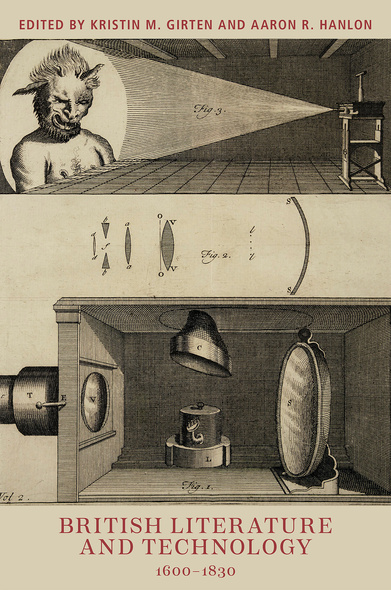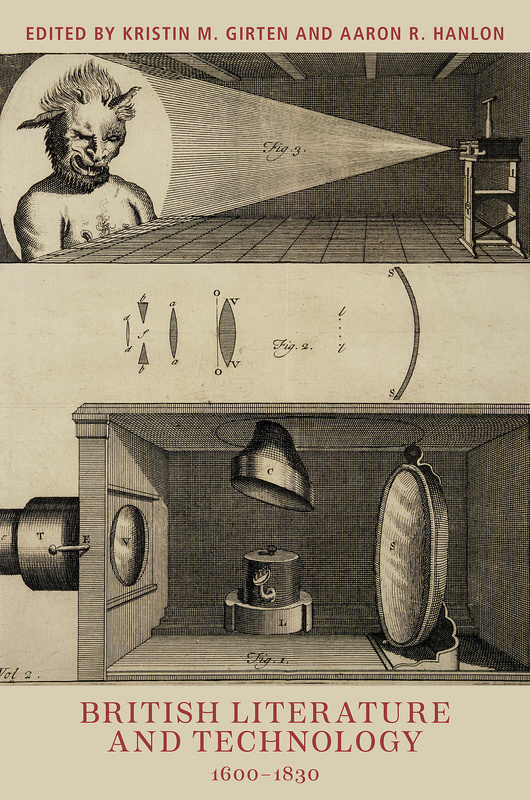
British Literature and Technology, 1600-1830
Enlightenment-era writers had not yet come to take technology for granted, but nonetheless were—as we are today—both attracted to and repelled by its potential. This volume registers the deep history of such ambivalence, examining technology’s influence on Enlightenment British literature, as well as the impact of literature on conceptions of, attitudes toward, and implementations of technology. Offering a counterbalance to the abundance of studies on literature and science in seventeenth- and eighteenth-century Britain, this volume’s focus encompasses approaches to literary history that help us understand technologies like the steam engine and the telegraph along with representations of technology in literature such as the “political machine.” Contributors ultimately show how literature across genres provided important sites for Enlightenment readers to recognize themselves as “chimeras”—“hybrids of machine and organism”—and to explore the modern self as “a creature of social reality as well as a creature of fiction.”
In a series of wide-ranging, thought-provoking, and finely argued essays, this volume marks a major advance in studies of science and literature. By thinking about literature itself as a kind of technology, the collection represents interdisciplinary scholarship at its best.
Innovative in concept, scope, and execution, Girten and Hanlon’s collection studies the rich interplay between literature and technology during the scientific revolution. Prefaced by a sophisticated introduction, this volume is necessary reading for students and scholars interested in literary studies, science, technology and society, and the history of science.
By focusing exclusively on humanity’s unruly tools, this book opens a compelling ‘mosaic’ view of technology that tiles together everything from the wiles of Jacobean stagecraft to the terza rima utopias of Romantic poets (10). . . . The essays gathered in British Literature and Technology, 1600–1830 will hold broad interest for . . . anyone—critic, teacher, student—seeking tools to comprehend human intervention in the world.
This collection is full of superb scholarship that makes substantial contributions to our understanding of technology.
AARON R. HANLON is an associate professor of English and chair of the Science, Technology, and Society Program at Colby College in Waterville, Maine. He is the author of A World of Disorderly Notions: Quixote and the Logic of Exceptionalism.
Kristin M. Girten and Aaron R. Hanlon
Chapter 1: Webster’s Baroque Experiments and the Testing of Technology in the Early 1600s
Laura Francis
Chapter 2: Telling Time in the Fiction of Mary Hearne and Daniel Defoe
Erik L. Johnson
Chapter 3: The Technology and Theatricality of Three Hours after Marriage’s “Touch-Stone of Virginity”
Thomas A. Oldham
Chapter 4: Gulliver’s Travels, Automation, and the Reckoning Author
Zachary M. Mann
Chapter 5: Designing the Enlightenment Anthropocene
Kevin MacDonnell
Chapter 6: Technology, Temporality, and Queer Form in Horace Walpole’s Gothic
Emily M. West
Chapter 7: Telegraphic Supremacy in Maria Edgeworth’s “Lame Jervas”
Deven M. Parker
Chapter 8: Percy Shelley, Political Machines, and the Pre-History of the Post-Liberal
Jamison Kantor
Afterword: On the Uses of the History of Technology for Literary Studies and Vice Versa
Joseph Drury
Bibliography
Notes on Contributors
Index




